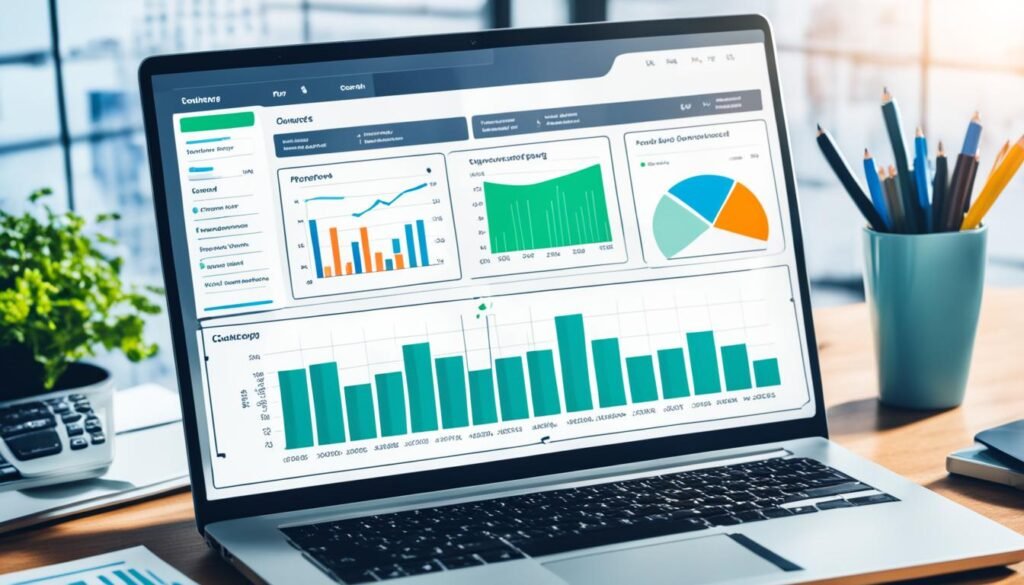In today’s fast-paced world, personal finance has become an increasingly important aspect of everyday life. Yet, many individuals lack the necessary knowledge and skills to effectively manage their money, plan for the future, and achieve financial security. Fortunately, there is an abundance of free online personal finance courses and resources available to help individuals improve their money management and personal finances.
The first step towards financial success is recognizing the need for financial education. As the source notes, “It can never hurt to try and be better informed about how you spend money.” With the rise of online learning platforms, individuals now have access to a wide range of personal finance courses that cover everything from budgeting and investment strategies to debt management and retirement planning.
Key Takeaways
- Personal finance is a critical aspect of everyday life, but it is often not properly taught in schools.
- There is an abundance of free online personal finance courses and resources available to improve money management skills.
- Online personal finance courses provide a convenient and accessible way to learn about financial literacy, budgeting, investment strategies, and more.
- Paid personal finance courses from reputable providers often offer more in-depth and comprehensive content, as well as the opportunity to earn certifications.
- Choosing the right personal finance course requires assessing your learning goals and evaluating the course content and reviews.
Importance of Personal Finance Education
In today’s complex financial landscape, personal finance education has become a critical component of an individual’s overall well-being. However, the lack of financial literacy in schools has left many adults struggling to manage their financial knowledge and money management skills effectively.
Lack of Financial Literacy in Schools
Historically, personal finance has often been overlooked in school curriculums, leaving a significant gap in the financial skills of many young adults. This absence of comprehensive financial education can have far-reaching consequences, as individuals may find themselves ill-equipped to make informed decisions about budgeting, saving, investing, and debt management.
Long-term Benefits of Financial Knowledge
Acquiring financial knowledge and developing financial skills can have a profound impact on an individual’s long-term financial stability and financial success. By understanding the fundamentals of money management, people can make more informed choices that contribute to their financial future, ultimately leading to greater financial security and peace of mind.
Online Personal Finance Courses: A Convenient Solution

In today’s digital age, the abundance of online resources, including blogs, YouTube channels, and a wide variety of online personal finance courses, have made financial education more accessible and convenient than ever before. These online learning platforms provide a structured approach to mastering personal finance, with courses led by vetted industry professionals and experts.
Flexibility and Accessibility
Online personal finance courses offer a level of flexibility and accessibility that traditional in-person classes cannot match. Individuals can learn at their own pace, on their own schedule, and from the comfort of their own homes, making it easier to fit personal finance education into their busy lives.
Variety of Course Providers
The online learning landscape is brimming with a diverse selection of course providers offering personal finance courses. From renowned universities and educational platforms to independent financial experts, learners have access to a wide variety of course offerings to suit their unique needs and learning preferences.
Free Online Personal Finance Courses

In today’s digital age, individuals seeking to improve their personal finance skills have access to a wealth of free online personal finance courses. These courses provide a convenient and cost-effective way to develop a financial foundation and gain invaluable debt management strategies. Let’s explore some noteworthy free offerings:
Udemy’s “Personal Finance 101: Everything You Need to Know”
Udemy, a leading online learning platform, offers the comprehensive Personal Finance 101 course. This course covers a wide range of topics, from budgeting and saving to investing and retirement planning, equipping learners with the fundamental personal finance skills needed to achieve financial stability and success.
Skillshare’s “My Financial Mountain: Understanding Your Path to a Solid Financial Foundation”
Skillshare, another popular online learning community, provides the “My Financial Mountain” course, which guides students through the process of building a solid financial foundation. This course delves into debt management, expense tracking, and the development of personalized financial strategies to help individuals take control of their personal finances.
Alison’s “Introduction to Managing Your Personal Finance Debts”
Alison, a global online learning platform, offers the “Introduction to Managing Your Personal Finance Debts” course. This course focuses specifically on debt management, providing learners with the knowledge and tools necessary to tackle various types of personal debt, from credit card balances to student loans, and ultimately achieve financial freedom.
Personal Finance Courses

The world of personal finance can be complex, but with the abundance of online learning resources and education resources available, individuals can now easily access the knowledge and tools needed to improve their financial literacy and achieve long-term financial success. The first source provides a comprehensive overview of the various personal finance courses that are available, both free and paid, covering a wide range of topics from budgeting and investment strategies to debt management and retirement planning.
These online personal finance courses offer a structured and organized approach to financial education, with lessons and materials curated by industry professionals and experts. Whether you’re a beginner looking to master the fundamentals of personal finance or an experienced individual seeking to further refine your money management skills, there is a course that can cater to your specific needs and learning goals.
The abundance of education resources in the field of personal finance speaks to the growing recognition of the importance of financial literacy. By investing time in these online learning opportunities, individuals can gain valuable insights and practical strategies to navigate their financial literacy journey with confidence and achieve their long-term financial objectives.
| Course Provider | Course Title | Key Topics Covered |
|---|---|---|
| Udemy | Personal Finance 101: Everything You Need to Know | Budgeting, Investing, Debt Management, Retirement Planning |
| Skillshare | My Financial Mountain: Understanding Your Path to a Solid Financial Foundation | Goal Setting, Budgeting, Saving, Investing |
| Alison | Introduction to Managing Your Personal Finance Debts | Debt Repayment Strategies, Credit Management, Budgeting |
These personal finance courses are just a few examples of the extensive offerings available to individuals seeking to enhance their financial literacy and gain a deeper understanding of personal finance best practices. By leveraging these online learning opportunities, individuals can take control of their financial situation and work towards achieving their long-term financial goals.
Paid Online Personal Finance Courses

While the abundance of free online personal finance courses provides an excellent starting point for individuals seeking to improve their financial literacy, there are also paid options that offer more in-depth and comprehensive content. These paid courses often come from top universities and industry experts, providing learners with the opportunity to earn certificates and interact directly with instructors.
Coursera’s Offerings from Top Universities
One of the leading providers of paid online personal finance courses is Coursera, a renowned online learning platform that partners with top universities and institutions around the world. Through Coursera, individuals can access a wide range of paid online personal finance courses that cover topics such as budgeting, investment strategies, retirement planning, and debt management. These courses are designed and taught by renowned experts in the field of personal finance, ensuring learners receive high-quality, specialized instruction.
Specialized Courses on Specific Topics
In addition to the comprehensive personal finance courses available on Coursera, there are also a variety of specialized courses offered by other top universities and educational providers. These courses dive deep into specific personal finance topics, such as estate planning, insurance, or financial planning for small businesses, providing learners with in-depth knowledge and skills in these areas. By enrolling in these paid online personal finance courses, individuals can tailor their financial education to their specific needs and goals.
Choosing the Right Personal Finance Course

When it comes to online learning and financial education, selecting the right personal finance course is crucial. The abundance of course content and course reviews available can make the decision-making process overwhelming. However, by carefully assessing your learning goals and evaluating the course offerings, you can find the perfect personal finance course to meet your unique financial needs.
Assessing Your Learning Goals
Before diving into the vast array of personal finance courses, take the time to reflect on your specific learning goals. Are you a beginner seeking to master the fundamentals of personal finance, or do you have more advanced knowledge and want to delve deeper into topics like investment strategies or retirement planning? Identifying your financial education needs will help you narrow down the course content that aligns with your objectives.
Evaluating Course Content and Reviews
Once you have a clear understanding of your learning goals, explore the course content of various personal finance courses. Look for courses that cover the topics you’re most interested in, such as budgeting, debt management, or wealth-building. Additionally, pay close attention to course reviews from previous participants to gauge the quality of instruction, engagement, and overall satisfaction with the online learning experience.
By carefully considering your learning goals and thoroughly evaluating the course content and reviews, you can confidently choose the personal finance course that will provide you with the knowledge and tools necessary to achieve your financial goals and secure your financial future.
| Learning Goals | Recommended Courses | Key Features |
|---|---|---|
| Mastering Personal Finance Fundamentals | Udemy’s “Personal Finance 101: Everything You Need to Know” Coursera’s “Fundamentals of Personal Finance” Specialization |
Comprehensive coverage of budgeting, credit management, and investment basics Interactive lessons and assessments to reinforce learning |
| Advancing Financial Planning and Wealth Building | Skillshare’s “Financial Planning: Strategies for Long-Term Wealth” Alison’s “Introduction to Personal Financial Planning” |
Detailed instruction on retirement planning, tax optimization, and estate planning Practical exercises and case studies to apply knowledge |
| Addressing Specific Financial Challenges | Udemy’s “Debt-Free: A Step-by-Step Guide to Becoming Debt-Free” Coursera’s “Credit Scores and Credit Reports Specialization” |
Targeted courses focused on debt management, credit building, and financial recovery Expert guidance and personalized feedback to overcome financial obstacles |
Budgeting and Money Management

Effective budgeting and money management are essential skills for achieving long-term financial success. One powerful tool that can help individuals take control of their personal finances is Google Sheets, a versatile spreadsheet application that makes creating and maintaining a budget simple and accessible.
Creating a Budget with Google Sheets
Google Sheets provides a user-friendly platform for building a detailed budget that tracks expenses and income. By creating a personalized spreadsheet, individuals can easily categorize and monitor their spending, identify areas for cost-cutting, and ensure that their financial goals remain on track.
Tracking Expenses and Income
Closely tracking expenses and income is a crucial step in effective financial management. Google Sheets makes this process straightforward by allowing users to input and organize their financial data, providing a clear picture of where their money is going and where they can optimize their spending habits.
By leveraging the power of Google Sheets, individuals can take control of their personal finances, create a sustainable budget, and make informed decisions that will lead to long-term financial stability and growth.
Investment Strategies and Retirement Planning

As individuals work towards their financial goals, understanding investment strategies and retirement planning becomes increasingly crucial. Many of the top-rated online personal finance courses delve into the complexities of investment vehicles and help learners navigate the path to a secure financial future.
Understanding Investment Vehicles
From stocks and bonds to certificates of deposit and alternative investment options, these courses provide a comprehensive overview of the different investment vehicles available. Learners gain insights into the risks and potential rewards associated with each, empowering them to make informed financial planning decisions that align with their personal finance objectives and retirement needs.
Calculating Retirement Needs
Effective retirement planning requires a clear understanding of one’s financial education and retirement needs. Online personal finance courses often include modules dedicated to helping individuals determine their projected retirement expenses, factor in anticipated income sources, and develop strategies to close any potential funding gaps. This holistic approach equips learners with the tools and knowledge to work towards a secure and fulfilling financial future.
| Investment Strategies | Retirement Planning |
|---|---|
|
|
Credit and Debt Management

As individuals strive to achieve financial stability, understanding credit management and debt management strategies becomes crucial. Online personal finance courses often delve into these essential topics, empowering learners with the knowledge to navigate the complexities of credit scores and develop effective debt repayment plans.
Understanding Credit Scores
A strong credit score is a vital component of financial health, as it can significantly impact an individual’s ability to secure loans, credit cards, and even housing. Many personal finance courses provide in-depth explanations on how credit scores are calculated, the factors that influence them, and strategies for building and maintaining a favorable credit profile.
Debt Repayment Strategies
Personal debt can be a significant burden, hindering an individual’s financial education and financial literacy. Online personal finance courses often cover a range of debt repayment strategies, including budgeting techniques, debt consolidation options, and the effective use of debt management tools. These resources empower learners to develop customized plans to systematically pay off their obligations and regain control of their personal finances.
By integrating the insights gained from comprehensive credit management and debt management courses, individuals can enhance their overall financial education and make more informed decisions to achieve long-term financial security.
Also Read: Exploring Prospects: Is Finance A Good Career Path?
Conclusion
The wealth of information and resources available through online personal finance courses underscores the growing emphasis on financial literacy and education. By taking advantage of these free and affordable learning opportunities, individuals can gain a deeper understanding of personal finance fundamentals, from budgeting and debt management to investment strategies and retirement planning. This enhanced financial knowledge empowers people to make more informed decisions, achieve their financial goals, and secure a stronger financial future.
Whether you’re a young adult just starting to navigate the complexities of personal finance or an experienced professional looking to refine your money management skills, online personal finance courses offer a convenient and accessible avenue for improving your financial well-being. By leveraging these educational resources, you can take control of your financial situation, develop robust money management habits, and lay the foundation for long-term financial success.
As you explore the diverse range of personal finance courses available online, remember to assess your learning objectives, review course content and reviews, and select the program that best aligns with your specific needs and goals. By investing time and effort into your financial education, you can unlock the keys to achieving financial stability, security, and the freedom to pursue your dreams. Embrace the power of online learning and embark on your journey towards financial mastery.
FAQs
Q: What are the best personal finance courses available online?
A: Some of the best personal finance courses available online include those offered on platforms like Coursera, Udemy, and edX. These courses cover a wide range of topics to help you improve your financial literacy and make better financial decisions.
Q: Are there any free personal finance courses I can take?
A: Yes, there are free personal finance courses available online that can help you learn about topics such as budgeting, saving, investing, and more. Platforms like Coursera and Khan Academy offer free courses on personal finance.
Q: What is the importance of having a financial plan?
A: Having a financial plan is crucial for achieving financial success as it helps you set goals, track your progress, and make informed decisions about your money. A well-thought-out financial plan can provide a roadmap for reaching your financial goals.
Q: How can personal finance courses help young adults with financial planning?
A: Personal finance courses geared towards young adults can provide valuable insights on topics such as budgeting, saving, investing, and managing debt. These courses can equip young adults with the knowledge and skills they need to make smart financial decisions early in life.
Q: What are some smart tools for decision-making in personal finance?
A: Smart tools for decision-making in personal finance include budgeting apps, investment calculators, retirement planning tools, and expense trackers. These tools can help you manage your finances more effectively and make informed decisions about your money.
Q: Is it worth investing in a paid personal finance course?
A: Investing in a paid personal finance course can be worth it if you are looking for more in-depth knowledge and specialized content. Paid courses may offer additional resources, personalized feedback, and expert insights that can help you enhance your financial skills.
Q: How can estate planning be incorporated into personal finance education?
A: Estate planning is an important aspect of personal finance education as it involves making decisions about how your assets will be managed and distributed after your death. Understanding estate planning concepts can help you protect your wealth and ensure your wishes are carried out.
Source Links
- https://www.cnbc.com/select/free-personal-finance-courses/
- https://www.bgca.org/programs/education/money-matters/
- https://money.usnews.com/money/personal-finance/family-finance/articles/worthwhile-online-personal-finance-courses
